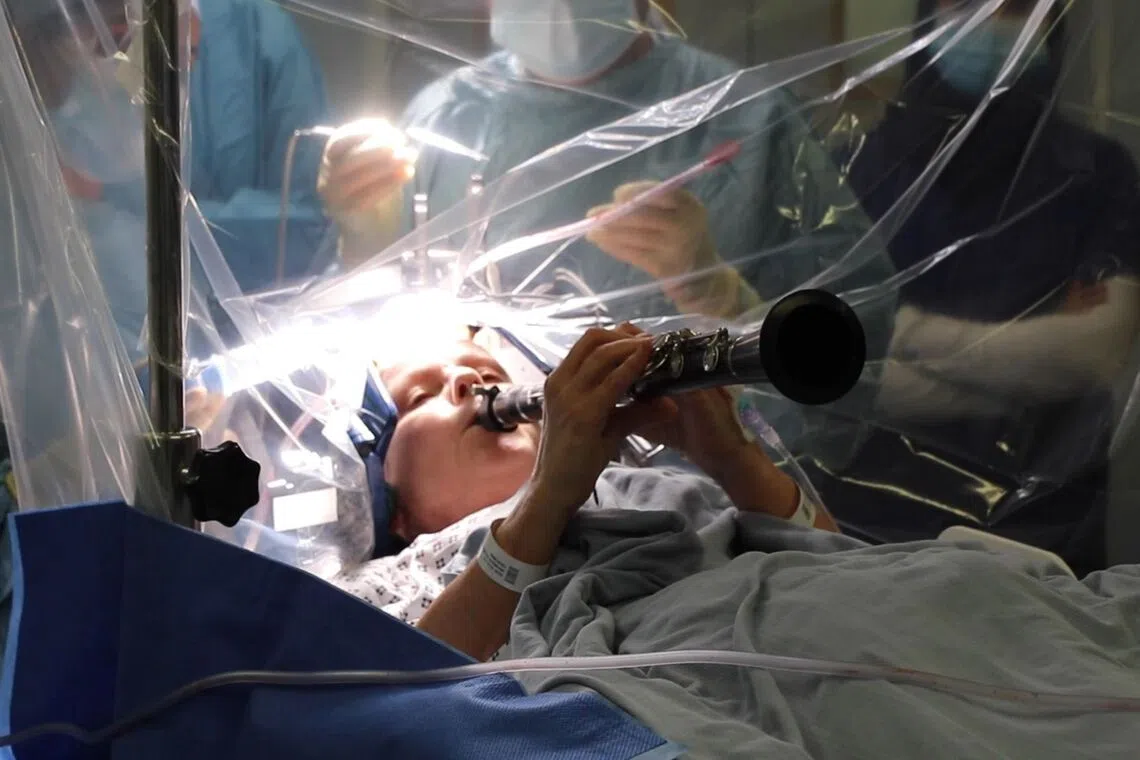British patient with Parkinson’s disease plays clarinet while undergoing brain surgery
Sign up now: Get ST's newsletters delivered to your inbox

Ms Denise Bacon blew on her instrument as doctors tinkered with her brain through 18mm holes drilled through her skull.
PHOTO: SCREENGRAB FROM KING'S COLLEGE HOSPITAL/VIMEO
Follow topic:
At King’s College Hospital in London, tunes from a clarinet could be heard from an operating room where 65-year-old Denise Bacon, who was diagnosed with Parkinson’s disease, was being operated on.
But instead of a mixtape, the music was being played live by Ms Bacon, who blew on her instrument as doctors tinkered with her brain through 18mm holes drilled through her skull.
In a video of the surgery, she is seen deftly moving her fingers over her clarinet as a group of hospital workers look on.
Ms Bacon had stopped playing her beloved clarinet in a concert band in 2020 after her symptoms meant she began experiencing slowness of movement and muscle stiffness, said the hospital in a statement on Oct 21.
But as soon as the doctors began operating on her brain, the retired speech and language therapist saw an immediate improvement.
“I remember my right hand being able to move with much more ease once the stimulation was applied and this in turn improved my ability to play the clarinet, which I was delighted with,” she was quoted as saying.
During the four-hour operation, Dr Keyoumars Ashkan performed Deep Brain Stimulation (DBS) to implant electrodes in Ms Bacon’s brain.
The electrodes were connected to a pulse generator, similar to a pacemaker, which delivered electrical impulses that modified brain activity and reduced Ms Bacon’s symptoms, said the hospital.
DBS is a surgical procedure used on selected patients with treatment-resistant movement disorders, including Parkinson’s disease, and helps improve motor symptoms in patients.
Dr Ashkan said 18mm holes – about the size of 10 cent coins – were made in Ms Bacon’s skull after a frame with precise coordinates was placed on her head. The frame acted as a “sat nav”, guiding the professionals to the correct positions within Ms Bacon’s brain to implant the electrode.
“Once the electrodes were in place on the left side of Denise’s brain, the current was switched on and an immediate improvement was noted in hand movements on her right side,” said Dr Ashkan.
He added that the same happened on her left side when the electrodes were implanted on the right side of her brain.
“We were delighted to see an instant improvement in her hand movements, and therefore her ability to play, once stimulation was delivered to the brain,” said Dr Ashkan.
The hospital told People magazine that the operation took place on July 16.
Parkison’s disease had also affected Ms Bacon’s ability to swim, dance and walk, but the surgery has helped.
“I’m already experiencing improvements in my ability to walk, and I’m keen to get back in the swimming pool and on the dance floor to see if my abilities have improved there,” she said.
According to the Parkinson’s Foundation, DBS helps relieve symptoms but does not cure or stop the disease from progressing.
After electrodes are inserted into the brain, an impulse generator battery (IPG) is implanted to deliver electrical stimulation to targeted areas in the brain that control movement. King’s College Hospital said Ms Bacon had opted for the rechargeable type of IPG, which is implanted in her chest and can last up to 20 years before it requires replacing.


